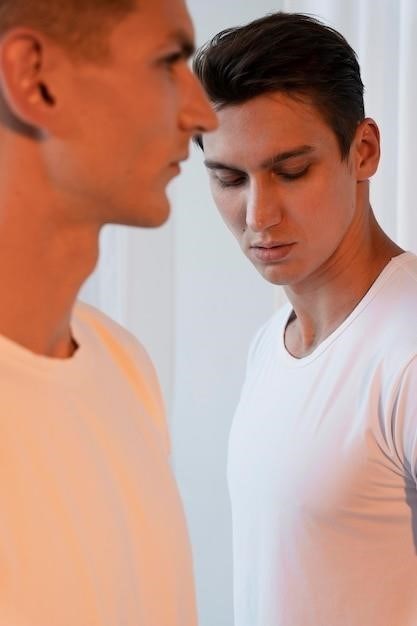Why Men Are Attracted to Certain Personality Traits
Research suggests men are drawn to confidence‚ self-assurance‚ and a good sense of humor․ Intelligence and intellectual connection also play significant roles․ Studies highlight the importance of socially desirable traits and the influence of personality on romantic attraction․ However‚ attraction is complex and multifaceted‚ influenced by various interacting factors․
The Role of Confidence and Self-Assurance
Confidence and self-assurance are highly attractive traits in a partner‚ irrespective of gender․ This is supported by numerous studies exploring attraction‚ indicating that individuals who exude self-belief are often perceived as more desirable․ This isn’t solely about outward displays of arrogance but rather a sense of inner strength and self-acceptance․ A confident person projects an air of stability and resilience‚ qualities that many find appealing in a long-term partner․ This confidence translates into various aspects of interaction‚ including clear communication‚ assertive decision-making‚ and the ability to navigate challenges independently․ The ability to stand firmly in one’s beliefs‚ while still maintaining respect for others’ perspectives‚ is a key component of this attractiveness․ Such self-assuredness radiates a powerful sense of self-worth‚ making the individual more appealing to potential partners․ It’s not merely about outward bravado but a deep-seated belief in one’s capabilities and value․
The Importance of a Good Sense of Humor
A good sense of humor is frequently cited as a highly desirable trait in a romantic partner․ It’s not simply about telling jokes; it’s about the ability to find amusement in everyday life‚ to diffuse tense situations with wit‚ and to share laughter with others․ Studies consistently demonstrate that people who possess a good sense of humor are perceived as more approachable‚ likable‚ and generally more attractive․ This is because humor often indicates intelligence‚ creativity‚ and a capacity for emotional resilience․ The ability to laugh at oneself suggests a healthy level of self-awareness and the capacity to not take oneself too seriously․ Moreover‚ shared laughter strengthens bonds and creates positive associations‚ making interactions more enjoyable and memorable․ This is particularly important in romantic relationships‚ where the ability to navigate challenges with lightness and humor can significantly improve overall relationship satisfaction and longevity․ A shared sense of humor can be a powerful foundation for a strong and lasting connection․
Attraction Based on Intelligence and Intellectual Connection
Beyond physical attraction‚ intellectual compatibility plays a crucial role in long-term relationship satisfaction․ Men often find intelligence and intellectual stimulation highly attractive․ This attraction isn’t solely about academic achievements; it’s about engaging in stimulating conversations‚ sharing ideas‚ and experiencing a sense of intellectual kinship․ A partner who can challenge one’s thinking‚ offer new perspectives‚ and engage in thoughtful discussions fosters personal growth and intellectual curiosity․ The ability to connect on an intellectual level creates a deeper bond beyond superficial interactions․ This connection often translates into shared interests‚ deeper understanding‚ and a sense of mutual respect․ The capacity for intellectual stimulation and engaging conversation provides a lasting source of fascination and connection‚ enriching the relationship over time․ This intellectual spark is a powerful element in building a strong and enduring partnership;

Physical Attractiveness and Its Influence
While personality plays a crucial role‚ initial attraction often involves physical appearance․ Studies show preferences for certain physical traits vary‚ influenced by cultural norms and individual preferences․ However‚ physical attractiveness’s impact often diminishes over time as relationships develop․
The Significance of Masculine Features and Physical Build
The perception of masculinity significantly influences physical attraction․ Research indicates that heterosexual women often exhibit a preference for men possessing traditionally masculine features‚ such as a muscular build‚ a strong jawline‚ and a defined physique․ These features are often associated with higher testosterone levels‚ which are linked to perceived dominance and genetic fitness․ However‚ it’s crucial to note that preferences for masculine features vary across cultures and individuals․ Some women may find less traditionally masculine features equally or even more appealing․ The significance of masculine features is therefore not universal and should not be interpreted as a definitive indicator of attractiveness for all women․
Furthermore‚ the importance placed on a muscular build and other traditionally masculine traits can be influenced by societal norms and media representations․ While some women may find these features inherently attractive‚ others may place greater emphasis on other physical attributes or personality traits․ The concept of “masculine ideal” is constantly evolving‚ shaped by cultural shifts and individual experiences․ It’s vital to acknowledge the diversity in preferences regarding physical attributes and avoid generalizations about what constitutes universally attractive masculine features․
The Impact of Self-Care and Grooming Habits
While physical attributes play a role‚ self-care and grooming significantly impact how attractive men are perceived․ A 1997 study by Mehrabian and Blum highlighted the importance of self-care in attractiveness ratings․ Participants consistently ranked individuals who demonstrated good hygiene and grooming practices as more appealing․ This suggests that maintaining personal cleanliness‚ including regular showering‚ clean clothing‚ and well-maintained hair‚ contributes substantially to overall attractiveness․ These practices signal self-respect and consideration for others‚ enhancing a positive overall impression․ Beyond basic hygiene‚ grooming choices such as facial hair styling or haircut can also influence attractiveness‚ with preferences varying among individuals and cultures․
However‚ it’s crucial to emphasize that self-care extends beyond superficial aspects․ It encompasses overall health and well-being‚ including fitness‚ nutrition‚ and mental health․ A healthy lifestyle often translates to improved physical appearance and increased confidence‚ both contributing to attractiveness․ Therefore‚ while grooming habits influence initial impressions‚ the broader context of self-care significantly impacts how appealing an individual is perceived to be‚ reflecting a holistic approach to personal well-being and self-presentation․

Social Status and Economic Factors
Income and occupational status can influence attraction․ Studies show a positive correlation between higher income and romantic attraction‚ especially when paired with desirable personality traits․ Social desirability and personality often interact with economic factors to shape attraction․
Income and Occupational Status as Attractiveness Factors
Research indicates a complex interplay between economic factors and attraction․ While some studies suggest a positive correlation between higher income and perceived attractiveness in men‚ this effect isn’t universally consistent․ The impact of income on romantic attraction appears to be moderated by other factors‚ particularly the target’s personality traits․ For instance‚ men with high incomes might be considered more attractive if they also possess socially desirable personality traits‚ such as kindness‚ humor‚ or intelligence․ Conversely‚ high income alone may not significantly enhance attractiveness if other crucial aspects‚ like personality or physical appearance‚ are lacking․ Occupational status‚ similar to income‚ can contribute to perceived attractiveness but often intertwines with other factors such as perceived social status and the associated lifestyle․ Therefore‚ the influence of income and occupational status on attraction is not simply a direct correlation but a nuanced relationship influenced by a multitude of interacting factors․ Further research is needed to fully understand this complex dynamic and the extent to which economic factors contribute to overall attractiveness compared to personality and physical traits․
The Influence of Social Desirability and Personality Traits
Social desirability‚ encompassing traits like kindness‚ humor‚ and intelligence‚ significantly impacts attraction․ While physical attributes initially draw attention‚ lasting attraction hinges on personality․ Studies show men value women who exhibit warmth‚ empathy‚ and a positive outlook․ A good sense of humor‚ often associated with social intelligence and emotional maturity‚ proves highly attractive․ Conversely‚ negative traits like arrogance or aggression tend to deter․ The interplay between social desirability and personality is crucial; a woman perceived as socially desirable is more likely to be viewed as attractive even if she doesn’t fit conventional beauty standards․ This suggests that personality traits play a dominant role in long-term attraction‚ outweighing the initial impact of physical appearance․ Furthermore‚ the specific combination of desirable traits varies between individuals‚ reflecting diverse preferences and personal values․ Understanding this nuanced relationship between social desirability‚ personality‚ and attraction offers crucial insights into the complexities of romantic relationships․
Other Factors Contributing to Attraction
Beyond personality and physical attributes‚ various factors influence attraction; Shared interests‚ values‚ and life goals contribute significantly․ Cultural background and individual experiences also shape preferences․ The dynamics of interaction and perceived compatibility play crucial roles in forming attraction․
The Role of Personality in Romantic Attraction
Personality plays a pivotal role in shaping romantic attraction‚ extending beyond surface-level characteristics․ While physical attractiveness holds initial appeal‚ lasting attraction often hinges on deeper compatibility․ Studies consistently reveal that traits like confidence‚ humor‚ and emotional intelligence significantly influence attraction․ A good sense of humor often signals a lighthearted nature and ability to navigate life’s challenges with grace‚ making individuals more appealing․ Emotional intelligence‚ encompassing self-awareness‚ empathy‚ and effective communication‚ fosters deeper connections and strengthens relationships․ Conversely‚ negative personality traits like insecurity‚ narcissism‚ or aggression can deter attraction and hinder relationship success․ The interplay between personality and individual preferences creates a complex dynamic in romantic attraction‚ highlighting the importance of compatibility and shared values․
